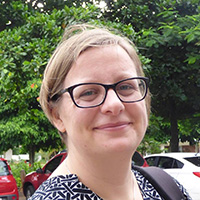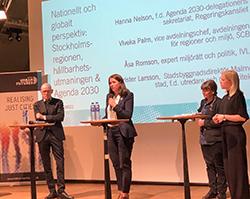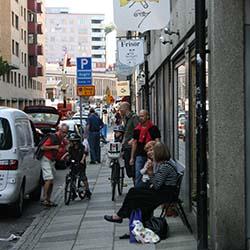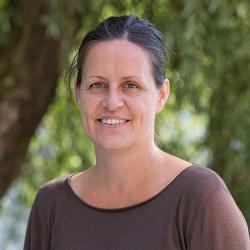
New Mistra Urban Futures node in Stockholm
It is now official that Mistra Urban Futures will establish a node in Stockholm. The decision was taken by the Centre’s Board in March 2017.
Now that Stockholm and Malmö (in 2016) have joined the Mistra Urban Futures network, it also means that all Swedish cities competing for the Mistra grant for sustainable development in 2009 now are working together.
The Director of the Centre, Professor David Simon, points out that this represents the culmination of a process initiated in 2014 to engage the three main Swedish urban centres collaboratively in order to promote our experimental work with inter-institutional partnerships undertaking co-production in their very different contexts:
“Indeed, this also forms part of a broader strategy to establish research partnerships in additional continental regions, especially Asia and Latin America during our second phase of work. This will enable us to draw lessons about how transdisciplinary co-production can work in diverse conditions around the world.”
 Assistant Professor Sara Borgström, KTH Royal Institute of Technology, has coordinated the proposal for the Stockholm node.
Assistant Professor Sara Borgström, KTH Royal Institute of Technology, has coordinated the proposal for the Stockholm node.
“This node will fill a coordination gap in Stockholm. The region faces a lot of challenges, but also has high ambitions towards sustainable development. There are many engaged actors, however there is a severe fragmentation and disconnect between the many initiatives and projects. We hope that this platform will contribute to a better overview and synergies through the planned knowledge co-creation processes”, says Professor Borgström.
The Stockholm node will be located at Openlab which is an already established neutral space for co-creation and transdisciplinary projects that aim to create conditions that make Stockholm an international centre for addressing societal challenges. In order to address a diversity of societal challenges, Openlab involves students, researchers, the public sector, companies, non-profit organizations and citizens.
“We see this as a natural next step to fulfil the goals of Openlab, where the Stockholm node will strengthen the connections to ongoing research in the region, in Sweden and internationally and further deepen our knowledge and skills in trans-disciplinary, inquiry based processes”, says Ivar Björkman, director of Openlab.
Arena for collaboration
The Stockholm team intends to establish a neutral meeting space where all partners in the consortium can come together to work on joint challenges. They will contribute towards Mistra Urban Futures’ Research Agenda of Realising Just Cities, i.e. cities which are Accessible, Green and Fair, with a particular focus on socio-ecological issues.
The two recent international agreements and global frameworks, the Sustainable Development Goals (SDGs) and the New Urban Agenda form the global policy context that Mistra Urban Futures as a whole will contribute towards. The team in Stockholm will be part of a comparative project which will follow the implementation of the Urban SDG at city level, including all cities connected to the Centre, namely Gothenburg, Sheffield-Manchester, Malmö, Kisumu and Cape Town, along with those currently being identified for new partnerships in Asia and Latin America.
The Stockholm Consortium
The following organisations form the Stockholm consortium:
• Openlab/City of Stockholm
• Stockholm Resilience Centre (SRC)
• IVL Swedish Environmental Research Institute
• KTH, Royal Institute of Technology
• Stockholm University
• Global Utmaning
• Quantified Planet
About Mistra Urban Futures
Mistra Urban Futures is an international research and knowledge centre on urban sustainability. We strive towards Realising Just Cities which are Accessible, Green and Fair. This is achieved through transdisciplinary co-production and comparative urban research at Local Interaction Platforms in Gothenburg, Sheffield-Manchester, Kisumu and Cape Town – and now also in Malmö and Stockholm.
The centre was established in 2010 and is financed by Mistra, the Swedish Foundation for Strategic Environmental Research; Sida, the Swedish International Development Cooperation Agency; and a Gothenburg Consortium consisting of Chalmers University of Technology, University of Gothenburg, IVL Swedish Environmental Research Institute, City of Gothenburg, County Administrative Board of Västra Götaland, The Göteborg Region Association of Local Authorities (GR) and Region Västra Götaland. See full list of partners for all platforms.
Questions?
Please contact:
David Simon, Director, Mistra Urban Futures, david.simon@chalmers.se, +46-708 64 27 80.
Sofie Iveroth Pandis, Project Coordinator & Project Manager, Mistra Urban Futures Stockholm node, sofie.pandis.iveroth@openlab.se
Sara Borgström, Convener of the Management group, Mistra Urban Futures Stockholm node, sara.borgstrom@abe.kth.se
Ivar Björkman, Interim Co-director, Mistra Urban Futures Stockholm Node, Director Openlab, ivar.bjorkman@openlab.se
Jenny Sjödin, Communications Manager, Mistra Urban Futures, jenny.sjodin@chalmers.se, +46-723 54 35 59
Photo: Flickr.com, Tommie Hansen, Djurgårdsbron, tram and a pink sunset (Stockholm)







